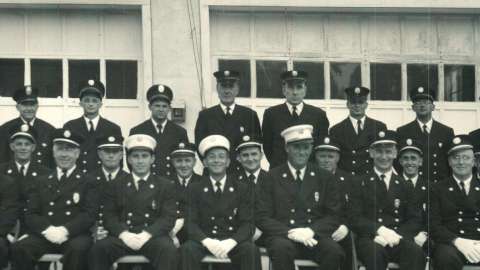Although Dr. Donnal Crohan joined the Raleigh Fire Department only a few weeks ago, his connection to fire service – and understanding what firefighters need – dates back several decades. Crohan, who is the department’s first-ever psychologist, is the grandson of Edward Crohan, who co-founded the Flanders Fire Department on Long Island, N.Y., in the 1940s. While plenty has changed in fire departments since then, one key thing has remained: Those upon whom we depend during our most difficult times don’t receive enough support to meet the challenging task of responding. Dr. Crohan is determined to change that.
“This is work that I am invested in and believe in. I see myself in a position as similar to a coach who can help individual athletes, and the team as a group, perform better,” Crohan explains. “Firefighters are like star athletes who are expected to perform flawlessly every day. They save lives and protect residents’ property and dignity. But they do that without adoring fans or shiny trophies – and they also don’t typically get support from mental health coaches or sports psychologists.”
Crohan knows this not only from his grandfather, but also from his uncle, a Flanders Fire Department firefighter who passed away from injuries sustained from responding to the 9/11 tragedy. Crohan recalls the challenges his family experienced in the aftermath of those days.

For the past several years, Crohan has worked on getting firefighters more needed support services. He was consulting in the development of a program to help first responders when the job posting for a staff psychologist at the Raleigh Fire Department caught his attention.
“Over the years I’ve witnessed how firefighters and other first responders just have to figure out on their own how to cope with the bad stuff and that’s not right. It’s not reasonable. They need help with that.”
Clear Need for a Psychologist
While some fire departments have counselors on staff, RFD is believed to be the first fire department in North Carolina to employ a full-time staff psychologist. Dr. Crohan will also be available to help Raleigh Fire Department retirees.
Counselors often focus on the aftermath of a crisis or how extreme situations impact the participants, but psychologists are trained for both preventative as well as after-event care. They can provide support at any time or situation, going beyond simple counseling, Crohan explains. “They can implement interventions to mitigate challenges, education in preventative strategies and assess with objective tests to determine the level of need or concern that’s appropriate. Some psychological help can prevent emotional pain through prevention and preparation.”
Raleigh Fire Chief Herbert Griffin says the need for the new position was clear. “Firefighters are inherently exposed to traumatic and stressful incidents daily,” Griffin says. “Historically, the fire service profession has compartmentalized traumatic events to help prepare for the next potential incident that could be traumatic, too. But data show this repetitive cycle could create long-term impacts on employees. My No. 1 priority is the health and safety of our organization and therefore it was imperative to implement a staff psychologist to provide psychological care and treatment for recruits, sworn staff and civilian employees.”
Key: Avoid Anticipating Needs
Crohan has a Ph.D. and a master’s degree in psychology and his experience reflects specialties in forensic, geriatric, career development, personality theory, and adjustment to life changes. He has also used his experience to provide business environments and social organizations the scientifically demonstrated methods of confronting environmental challenges toward better functioning. He has facilitated group cooperation, better communication and risk-awareness trainings to foster a healthier, more successful operation.
In his role with Raleigh Fire, the key is not to anticipate what firefighters need. “It’s crucial for me to listen to them to learn what they need and then try to determine how I can help them perform better,” Crohan says. “Sometimes the need might be related to the challenge of living together in a fire station, while at other times it might be something more dramatic, such as losing someone during an emergency call. Sometimes there’s a clear and direct solution and sometimes it’s my role to encourage the sharing of information on how the human mind works, to better determine the more hidden causes for challenges that people face, especially when working in groups.”
Crohan is currently setting up an office in downtown Raleigh to meet with firefighters. He also has a private phone line firefighters can use to schedule appointments or to call if situations during emergency calls require his expertise. In addition, he’s setting up training systems and programs for groups.
Crohan’s practice is separate from RFD Chaplain Jeff Neal’s, but the two cooperate. For instance, Neal might refer a firefighter to Crohan. During and after tragic incidents, such as the death at the Raleigh Christmas parade a few weeks ago, the two work together.
Crohan sees his role as a professional who “helps firefighters be better at helping others in the community. Basically, I help them become better performers. When they go to that incident scene, they need to be at their best and I’m the coach helping with that moment when their best is most needed.”
